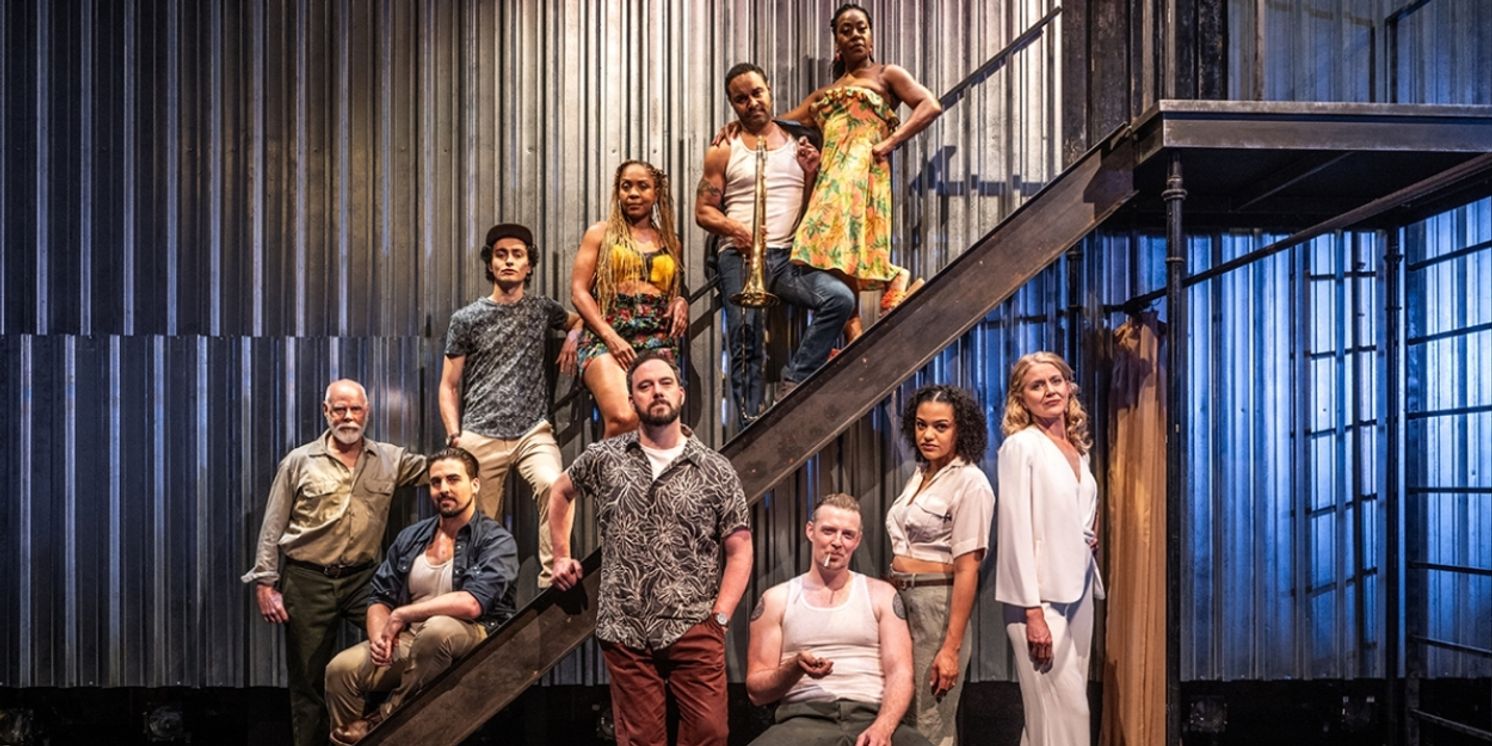Review: A STREETCAR NAMED DESIRE at Soulpepper
Soulpepper's production is the most reliable streetcar in Toronto

“OFF-ROUTE,” the tinny announcement suddenly bellowed on the 504 streetcar I was taking to see the remount of Soulpepper’s much-lauded A STREETCAR NAMED DESIRE. Annoyed but undeterred, I left the disappointing vehicle behind to walk the rest of the way to see Tennessee Williams’ sprawling classic about what happens when the unstoppable force, fading, fluttering Southern Belle Blanche DuBois (Amy Rutherford), meets the immovable object of her brother-in-law, pragmatic, animalistic Stanley Kowalski (Mac Fyfe). The oppressive heat on my walk proved the perfect prelude for a night of searing theatre, with Weyni Mengesha’s effectively musical direction providing an electric backdrop for a simmering contest of wills.
The first clash between Blanche’s longing for hazy magic and the clear light of day occurs as she gamely struggles her way towards the ironically-named street of Elysian Fields, where her sister in law Stella (Shakura Dickson) lives. Her visit is a surprise, and she’s greeted with some of surprises of her own: the Kowalskis are living in what she considers barely above squalor, and they’re going to have a baby. Blanche has a surprise of her own: she’s lost the family plantation, Belle Reve, due to generations of family debts, and has no other place to go.
In Lorenzo Savoini’s set design, there are no nods to the old, stately houses of New Orleans; instead, the focus is on the inside of the Kowalskis’ dilapidated one-bedroom apartment. Outside, we see only walls covered with large sheets of corrugated aluminum, the better to echo the caterwauling of the neighbourhood tomcats on a hot tin roof, or to bang on in a fit of fury that might make an audience member or two jump. These walls appear divorced from the play’s location, but shift and move to reveal some fascinating musical surprises.
Blanche immediately seems out of place in this hot, steamy universe. Mengesha emphasizes Blanche’s haughty, exhausted journey to her sister’s different world when Rutherford drags her suitcase past the audience down the aisle stairs, making the most of each clunk before she ascends to the front door. (One can forgive the relative anachronism of the wheeled suitcase due to the entertainment factor; the modern Coke cans next to the cases of Jax beer that stopped production in 1956 are a little stranger.) She also sticks out in Rachel Forbes’ striking costume design, a pristine, pressed white pantsuit at odds with Stella’s crop top and jeans.
Forbes uses Blanche’s changing costumes to clearly symbolize her deteriorating mental state throughout the evening, as the bright whites turn to frilly pinks as she frantically tries to recapture the innocence of youth, and then an almost painful mishmash of pieces that look like a small child has tried to play dress-up in her mother’s trunk by putting on every scrap she thinks is pretty.
Williams’ script is legendary for a reason: it delicately handles the push and pull of Blanche, Stanley, Stella, and Blanche’s would-be beau Mitch (Gregory Prest), the most “evolved” of Stanley’s friends with a sick mother and a sympathetic ear, teasing out dark secrets, tragic backstories, and maddening interpersonal relationships before letting bombs go off at various intervals. Rutherford’s Blanche is a nervous, trembling thing, but can expertly deflect suspicion and commentary while remaining the centre of attention, something like a greyhound in a tiara that refuses to stop chasing that uncatchable rabbit. Her increasing desperation is compellingly painful to watch, a nightmare of a person who insists on living in a daydream.
Next to her, Dickson’s Stella seems rooted and still, but her expressive face belies her more grounded body language. She shows how her worry for her sister wars with her craving for her husband, an impulse that will allow her to forgive him even a repugnant physical altercation.
As the wedge between the sisters, Fyfe explodes when the script demands it, but is also often soft-spoken, exploiting his quiet lines to emphasize the fireworks later on. Like the hiss of a lit match, the soft words are no less intense or dangerous, deepening the character from the simple brute Blanche sees to the strategist he actually is. When he whispers his famous line to Blanche during their climactic confrontation, it’s almost too muted to hear—a nifty trick, since the trouble with well-known works is that the audience often hears the legendary phrases without really listening to them. Fyfe makes us work for it.
Mengesha gives us long stretches of unadorned character interaction, where it’s plenty to watch the characters dance around each other, but also adds interesting directorial flourishes to make the space come alive, such as those mysterious set panels. She uses the lip of the stage as a stoop where the credulous Mitch treats Blanche with grave, reverent care (Prest’s version of Mitch, somewhere between mensch and nebbish, makes his later opprobrium all the more hurtful), and brings the actors into the audience at key moments.
Above all, she surrounds them and us with the music of the French Quarter, with boisterous jazz bursting through walls and into the audience, and a mournful arrangement of “Goodnight Ladies” (by Mike Ross with SATE) nothing like the one you might have heard in The Music Man. The fascinating but flawed world echoes the play’s thesis that any romantic vision of the past or a place is ultimately doomed to failure.
Though its characters’ dreams end in dust, this STREETCAR soars as an engaging night of theatre. For all its unreliability, it’s worth getting on a streetcar named 504 to get there.
Photo of the cast of A STREETCAR NAMED DESIRE provided by the company
Reader Reviews
Videos

